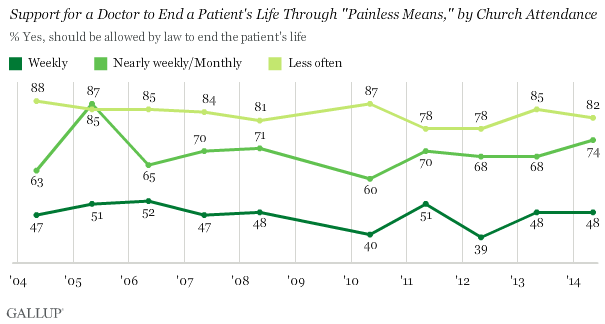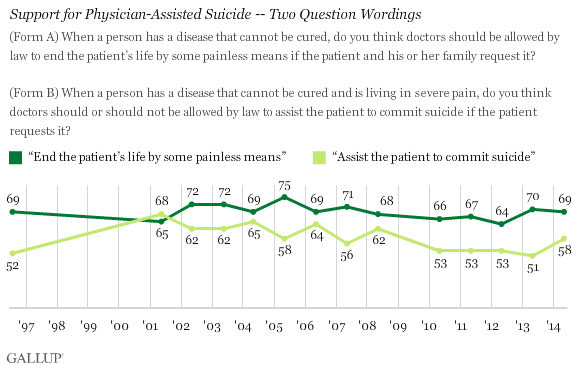WASHINGTON, D.C. -- Most Americans continue to support euthanasia when asked whether they believe physicians should be able to legally "end [a] patient's life by some painless means." Strong majorities have supported this for more than 20 years.

Although these are largely private family matters, controversy about euthanasia and other end-of-life situations has often become public -- most recently, regarding the death of iconic radio host Casey Kasem. His children and his wife fought in court over what to do in the final stages of Kasem's battle with Lewy body disease, a form of dementia. Ultimately, a judge granted his daughter the authority to have doctors remove his infusions of water, food, and medicine.
These data are from Gallup's May 8-11 Values and Beliefs poll, conducted before Kasem's death. Gallup began asking this question about euthanasia in 1947. At that time, Americans were about half as likely (37%) to support euthanasia as they are today. Support had grown by 1990, and since then, a large majority of Americans have backed euthanasia.
Support for euthanasia is related to Americans' underlying religiosity. The more frequently an American attends religious services, the less likely he or she is to support euthanasia. Less than half (48%) of those who frequent their places of worship weekly are likely to support the idea of a doctor "ending a patient's life by some painless means," compared with three in four Americans who attend services nearly weekly (74%) and 82% of those who go less often.

Diminished Majority Favors "Doctor-Assisted Suicide"
Americans are less likely to support euthanasia when the question emphasizes that the doctor would "assist the patient to commit suicide" than when the question does not mention the word suicide. Four states -- Oregon, Washington, Montana, and Vermont -- have legalized physician-assisted suicide, with the most recent being Vermont, in 2013.
In the most recent poll, 58% of Americans favor doctor-assisted suicide when the question is asked in this way. Support has varied between 51% and 68% since Gallup first asked about it in 1996.

Bottom Line
Americans have consistently maintained their support for euthanasia in recent decades. Prior to that, as far back as 1947, Americans were not in favor.
Although religious convictions often play a large role in one's support or opposition, the way the act of euthanasia is worded affects Americans' views on it, underscoring the issue's sensitivity. Life-ending scenarios are real for many Americans and their loved ones. And while the majority of Americans clearly support euthanasia -- a fairly rare moral issue for which there is widespread support -- that support is not unanimous. This is a reminder that these divisions play out in family decision-making every day.
Survey Methods
Results for this Gallup poll are based on telephone interviews conducted May 8-11, 2014, with a random sample of 1,028 adults, aged 18 and older, living in all 50 U.S. states and the District of Columbia. For results based on the total sample of national adults, the margin of sampling error is ±4 percentage points at the 95% confidence level.
For results based on the sample of 518 national adults in Form A, the margin of sampling error is ±5 percentage points.
For results based on the sample of 510 national adults in Form B, the margins of sampling error is ±5 percentage points.
Interviews are conducted with respondents on landline telephones and cellular phones, with interviews conducted in Spanish for respondents who are primarily Spanish-speaking. Each sample of national adults includes a minimum quota of 50% cellphone respondents and 50% landline respondents, with additional minimum quotas by time zone within region. Landline and cellular telephone numbers are selected using random-digit-dial methods. Landline respondents are chosen at random within each household on the basis of which member had the most recent birthday.
Samples are weighted to correct for unequal selection probability, nonresponse, and double coverage of landline and cell users in the two sampling frames. They are also weighted to match the national demographics of gender, age, race, Hispanic ethnicity, education, region, population density, and phone status (cellphone only/landline only/both, and cellphone mostly). Demographic weighting targets are based on the most recent Current Population Survey figures for the aged 18 and older U.S. population. Phone status targets are based on the most recent National Health Interview Survey. Population density targets are based on the most recent U.S. census. All reported margins of sampling error include the computed design effects for weighting.
In addition to sampling error, question wording and practical difficulties in conducting surveys can introduce error or bias into the findings of public opinion polls.
View survey methodology, complete question responses, and trends.
For more details on Gallup's polling methodology, visit www.gallup.com.
